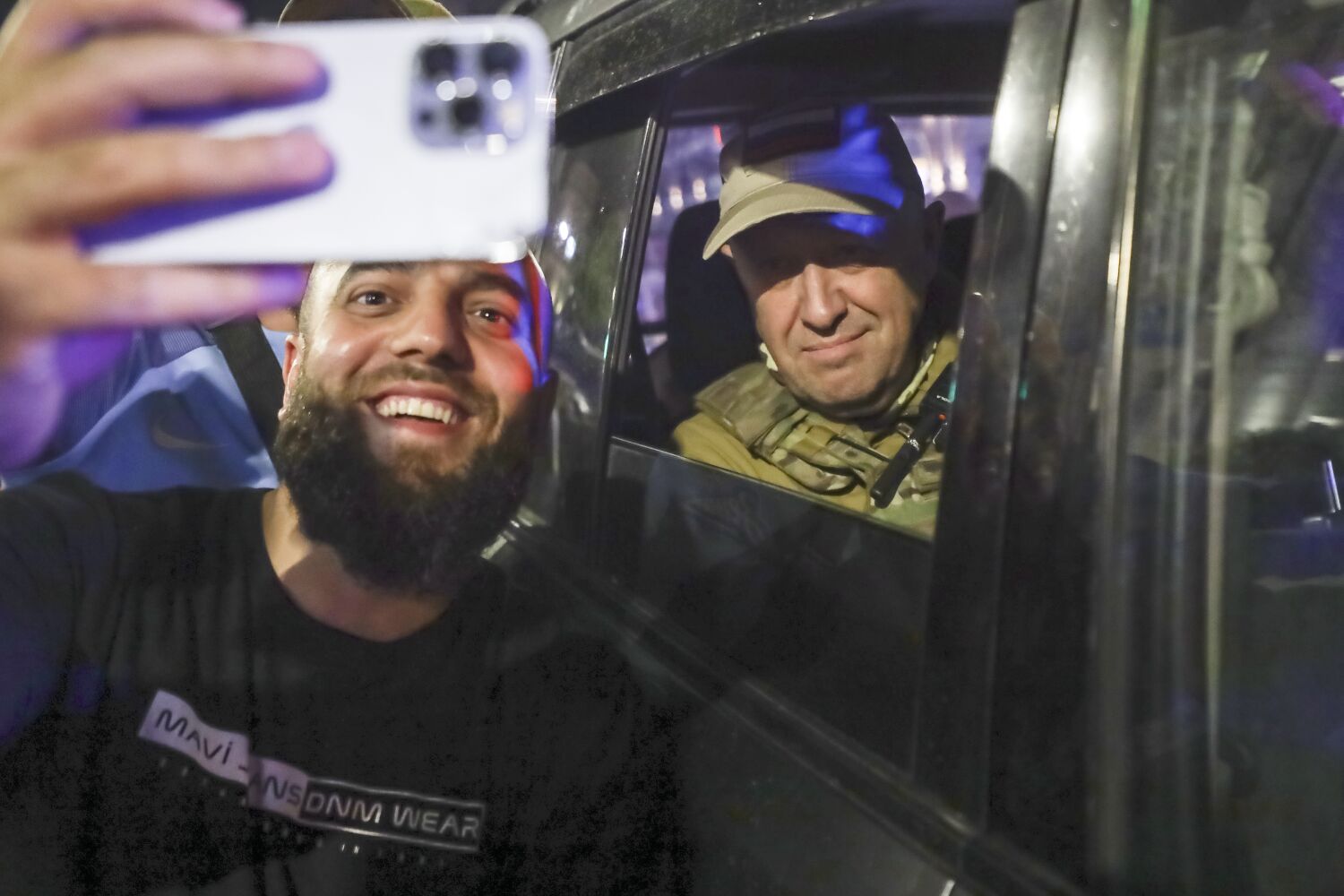Global Courant
In West Hollywood, home to one of the largest Russian-speaking communities in the United States, residents watched with hope and fear on Saturday as a mercenary uprising threatened to overthrow the Russian government and undermine its bloody invasion of Ukraine , seemed to decrease.
Some were buoyed by the news that Yevgeny Prigozhin, a wealthy Russian entrepreneur who owns the mercenary army known as the Wagner Group, announced that he was halting his advance on Moscow. Others, such as Andrei Braginski, dismissed the armed insurrection as an insignificant development in Russia, where the invasion of Ukraine and the mounting casualties have become increasingly unpopular.
“They are rebels without support,” said Braginski, 58, as he carried a bag of groceries filled with cherries, kefir and tomato juice outside Odessa Grocery on Santa Monica Boulevard. “I don’t think it will change the war. (Prigozhin) will not win and will not weaken the Russian army.”
Born in Estonia, Braginski has cousins in Russia and said he supports Ukraine and anyone who is on their side.
At the market, customers strolled past shelves of Russian sweets and crisps as a song by Russian-Lithuanian singer Kristina Orbakaite blared through the loudspeakers. Some spoke on the condition that they would not be identified for fear of reprisals by those who disagreed with their views.
Nina, 67, who grew up in the Ukrainian capital Kiev and refused to give her last name, was upbeat by news that the Wagner Group had halted its advance on Moscow.
“At the end of the day, peace will prevail,” she said as she searched the frozen food aisle for pierogies for her mother.
She noted that her sister and cousin live in Zaporizhia, a city in southeastern Ukraine that has seen heavy fighting in recent weeks.
Nina said she is not a fan of Ukrainian President Volodymyr Zelensky, but added that she does not support the war in her homeland.
“So many young children are dying,” she said. “There have been unimaginable tragedies.”
The Wagner Group is active in several countries and has fought alongside Russian troops in Ukraine. The mercenary operation in Ukraine relies on well-trained Russian military veterans and convicts who have been recruited from prisons and used for indiscriminate “human wave” attacks on Ukrainian troops, according to a recent report by the Congressional Research Service.
Regardless of the outcome of Prigozhin’s mercenary uprising, he has tapped into popular sentiment across Russia, using social media to denounce the corruption and ineptitude of Russian generals leading the war in Ukraine, said Robert English, director of Central European Studies at USC.
He said Prigozhin will continue to threaten Russian President Vladimir Putin’s long-standing grip on power.
“Prigozhin is hitting all the right notes,” English said in a telephone interview Saturday from Europe, where he has been following developments. “His message is catching on.”
In West Hollywood, Liana sat at her desk in a notary’s office and described the rebels as criminals, but added that “any means to overthrow Putin is good enough.”
“It is probably in Ukraine’s favor that the mutiny and disruption is taking place,” said the 26-year-old, who declined to give her last name out of concern for her mother in Russia. “I believe in the domino effect, that one event will influence another and then another. But nobody knows what will happen.”
Liana, who came to the United States nine years ago to attend drama school, called the war “surreal” and had complicated thoughts about US support for Ukraine.
“I don’t think the US supports Ukraine from the purity of its heart,” she said. “I think there is always a political agenda when a country gets involved. Still, it is good, because Ukraine does not have the same resources as Russia. And now it can fight back.”
But she doesn’t know how or when the war will end.
“I really hope for the best,” she said after a long pause. “I just want people to be safe and continue to live as they were. But so many things have happened that are irreversible. That will never be forgotten.”
Her colleague Nadia Akarsu, 36, recalls the day a bomb shook her awake in her Kiev apartment.
It was February 24, 2022, the day Russian troops stormed into her homeland.
“It’s terrible. We Ukrainians didn’t think it was possible in the 21st century,” she said.
Although she called the leader of the Wagner group a “criminal”, Akarsu was happy when she heard the news of their uprising against the Russian army.
“If an enemy is divided and there is conflict among themselves, that’s good,” she said. “I don’t think it will benefit Ukraine yet, but it will divert the attention of the Russian armed forces.”
Akarsu fled the war last year, leaving behind her father and many friends, and said she appreciated US support for Ukraine.
“The attack is a danger to world society and to peace,” she said. “The United States is the strongest country in the world and the leader of the world, and I’m glad they are taking their responsibility as a leader.”
As for how she thinks the war will end, Akarsu is hopeful.
“I hope and believe that Ukraine will regain all the territories occupied by Russia, and that we will be more independent and stronger than ever,” she said.
But she thinks it won’t happen anytime soon.








